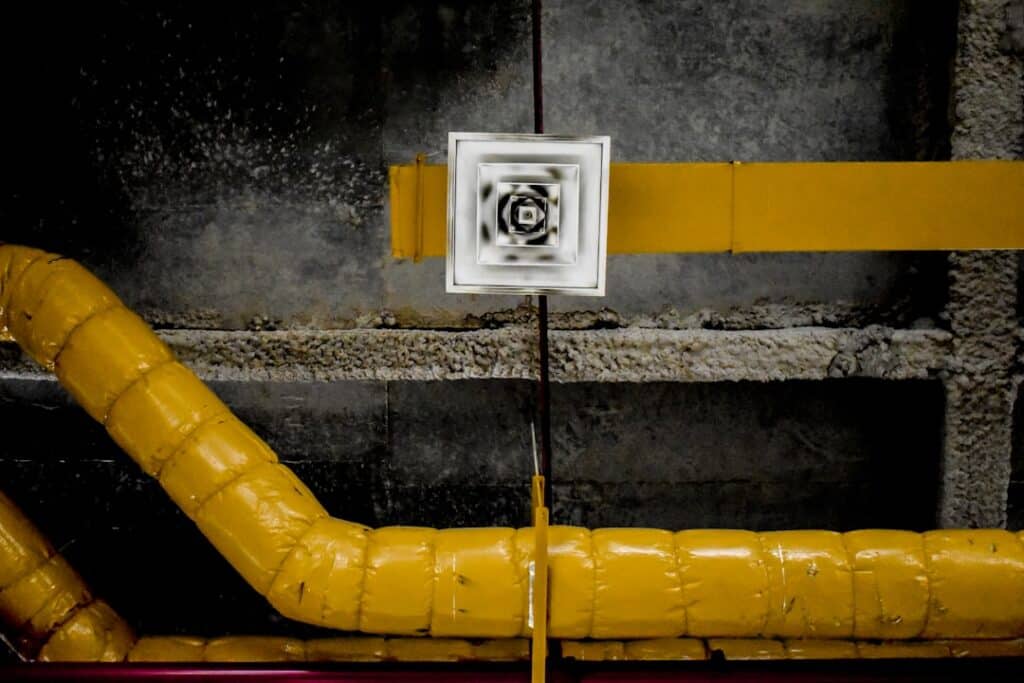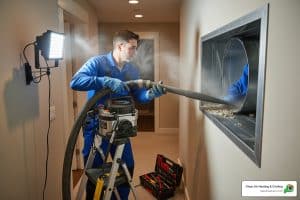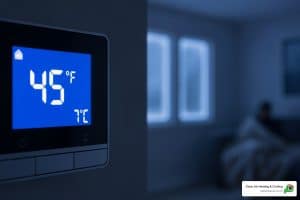Controlling Your Home Comfort in Everett, WA
When it comes to staying comfortable in Everett, keeping your HVAC system in top shape is essential. Everett HVAC is all about maintaining the right balance of comfort and efficiency in your home throughout the year. Whether the goal is to survive a scorching summer, fight off a freezing winter, or save on your utility bills, having a reliable HVAC service is crucial.
Key Points to Note:
– Comfort: Ensure your home remains at an ideal temperature, no matter the season.
– Efficiency: Modern HVAC systems are designed to save energy, which means lower utility bills.
– Reliability: Regular maintenance prevents unexpected breakdowns and extends the life of your system.
Our guide will walk you through everything you need to know about Everett HVAC systems, from choosing the right one to keeping it in top shape. We’ll also cover common issues and solutions to make sure your home stays the cozy haven it’s meant to be.

Understanding Everett HVAC Systems
Choosing the right HVAC system for your home in Everett is crucial for maintaining comfort and efficiency. Let’s dive into the types of HVAC systems, the benefits of quality systems, and how to select the best one for your needs.
Types of HVAC Systems
- Geothermal Systems: These systems use the stable temperatures underground to heat and cool your home. They are highly efficient and environmentally friendly, but the installation can be costly and requires significant yard space.
- Mini-Splits: These are ductless systems that provide flexibility in heating and cooling individual rooms. They are ideal for homes without existing ductwork and offer energy-efficient options.
- Furnaces: Furnaces are a common choice in Everett, especially during the chilly winter months. They can be powered by gas or electricity and are known for their reliability and efficiency.
Benefits of Quality HVAC Systems
Investing in a quality HVAC system comes with several benefits:
- Energy Efficiency: Modern HVAC systems are designed to use less energy, which translates to lower utility bills. For example, today’s electric furnaces are engineered to be more efficient, helping to bridge the cost gap with natural gas.
- Cost Savings: While the initial investment may be higher, the long-term savings on energy bills and fewer repair costs make quality systems a smart choice.
- Longevity: High-quality HVAC systems tend to last longer with proper maintenance. This means fewer replacements and a better return on your investment.
Selecting the Right HVAC System
When choosing an HVAC system, consider the following factors:
- Size: The size of your HVAC system should match the size of your home. An undersized system will struggle to maintain comfort, while an oversized system will cycle on and off too frequently, wasting energy.
- Brand: Opt for reputable brands known for reliability and performance. Brands like Mitsubishi and Lennox are often recommended for their quality and efficiency.
- Features: Look for features that enhance comfort and efficiency, such as programmable thermostats, variable speed fans, and advanced filtration systems.
By understanding the different types of HVAC systems and their benefits, you can make an informed decision that will keep your home comfortable year-round. Next, we’ll explore the importance of professional installation and routine maintenance to ensure your system runs smoothly.
Installation and Maintenance of HVAC in Everett
Professional Installation
Correct installation is crucial for the efficiency and long-term reliability of your HVAC system. At Clean Air Heating & Cooling, we ensure that every installation is done right the first time. Our team of experts will evaluate your home, discuss your needs, and tailor the installation process to fit your specific requirements.
A poorly installed HVAC system can lead to numerous issues, such as reduced efficiency, higher energy bills, and frequent breakdowns. To avoid these problems, our professionals follow industry best practices, ensuring that your system operates at peak performance from day one.
Benefits of Professional Installation:
- Efficiency: Proper installation ensures that your system runs efficiently, saving you money on energy bills.
- Longevity: A correctly installed system lasts longer and requires fewer repairs.
- Safety: Professional installation minimizes the risk of electrical issues and other hazards.
Routine Maintenance
Routine maintenance is key to keeping your HVAC system in top condition. Regular checks and cleaning can prevent minor issues from becoming major problems, ensuring that your system runs smoothly year-round.
Best Practices for Routine Maintenance:
- Filters: Replace or clean filters regularly to maintain airflow and improve indoor air quality. Dirty filters can cause your system to work harder, leading to higher energy consumption and potential damage.
- Duct Cleaning: Schedule duct cleaning to remove dust, debris, and allergens that can accumulate over time. Clean ducts improve air quality and system efficiency.
- Seasonal Checks: Perform seasonal checks to prepare your system for the changing weather. Inspect components such as the thermostat, coils, and refrigerant levels to ensure optimal performance.
By following these best practices, you can extend the life of your HVAC system and maintain a comfortable living environment. Routine maintenance not only enhances efficiency but also contributes to better indoor air quality and overall home comfort.
Next, we’ll discuss common HVAC problems and solutions in Everett, helping you troubleshoot issues and know when to call a professional.
Common HVAC Problems and Solutions in Everett
Troubleshooting Your HVAC System
HVAC systems can develop issues over time. Knowing how to troubleshoot can save you time and money. Here are some common problems and quick fixes:
1. System Blows Warm Air
If your HVAC system blows warm air when it should be cooling, it may be due to a malfunctioning compressor, a refrigerant leak, or a clogged air filter. A quick check of the air filter for dirt and debris can often resolve the issue. If the problem persists, you might need a professional to inspect the compressor or refrigerant levels.
2. Poor Airflow
Weak or insufficient airflow can be frustrating. This often happens due to leaky ducts or a faulty blower. Check your vents and registers to ensure they are not blocked. If the issue remains, it’s best to have a professional inspect your ductwork and blower.
3. High Energy Bills
Unusually high energy bills can indicate inefficiencies in your HVAC system. Dirty filters, leaks, or aging components can force your system to work harder. Regular maintenance, like changing filters and checking for leaks, can help reduce your energy bills.
4. Visible Leaks or Moisture
Water pooling around your HVAC unit or visible leaks can lead to corrosion and mold growth. This is often caused by a clogged condenser unit or refrigerant leaks. Addressing moisture problems promptly is crucial to prevent further damage.
5. Foul Odors
If you notice unpleasant smells coming from your HVAC system, it could be due to mold growth in the ducts or a burnt-out wire. A thorough cleaning and inspection by a professional can help eliminate these odors.
When to Call a Professional
While some problems can be fixed with DIY efforts, others require professional attention. Here are situations where you should call a professional:
Major Repairs
If your HVAC system has major issues like a broken compressor or significant refrigerant leaks, it’s time to call a professional. These problems require specialized tools and expertise.
System Upgrades
Upgrading to a more energy-efficient system or adding new features like a smart thermostat should be handled by professionals to ensure proper installation and functionality.
Safety Concerns
Any issues involving electrical components or gas lines should be addressed by a professional to avoid safety hazards. For example, a faulty gas furnace can lead to carbon monoxide leaks, which are dangerous.
Persistent Problems
If you’ve tried troubleshooting common issues and the problems persist, it’s best to get a professional evaluation. They can diagnose and fix underlying issues that DIY efforts might miss.
By knowing when to troubleshoot and when to call a professional, you can maintain your HVAC system’s efficiency and longevity.
Next, we’ll discuss how to optimize your home’s air quality, ensuring a healthier and more comfortable living environment.
Optimizing Your Home’s Air Quality
Importance of Good Indoor Air Quality
Good indoor air quality is essential for a healthy and comfortable home. Poor air quality can lead to a range of health problems, including asthma, allergies, headaches, and even more severe issues like respiratory diseases and cancer. It’s not just about health; cleaner air also means more comfort and energy savings.
Solutions for Improved Air Quality
Air Filters
One of the simplest ways to improve indoor air quality is by regularly changing your air filters. Air filters trap dust, pollen, and other airborne pollutants, keeping them out of your air supply. For optimal performance, change your air filters every 60-90 days. This not only improves air quality but also extends the lifespan of your HVAC system.
Ventilation
Proper ventilation is key to maintaining good indoor air quality. It helps remove stale air and pollutants from your home, replacing them with fresh air. Make sure your home has adequate ventilation, especially in areas like kitchens and bathrooms where moisture and odors can accumulate.
Air Purifiers
Air purifiers are a great addition to your home. They can remove a wide range of pollutants, including dust, pet dander, and even bacteria. Consider investing in a high-quality air purifier to keep your indoor air as clean as possible.
Humidifiers and Dehumidifiers
Maintaining the right humidity levels is crucial for air quality. High humidity can lead to mold growth, while low humidity can cause dry skin and respiratory issues. Use a humidifier to add moisture to the air during dry seasons and a dehumidifier to reduce moisture in humid conditions. Aim to keep your home’s humidity between 30% and 50%.
Regular Cleaning
Regular cleaning can significantly improve indoor air quality. Dust and vacuum your home frequently to remove allergens and pollutants. Don’t forget to clean carpets, curtains, and other fabrics that can trap dust and allergens.
By focusing on these solutions, you can greatly improve the air quality in your home, leading to better health, increased comfort, and energy savings.
Next, we’ll answer some frequently asked questions about Everett HVAC systems, covering everything from costs to maintenance schedules.
Frequently Asked Questions about Everett HVAC
Why Are New HVAC Units So Expensive?
New HVAC units come with a hefty price tag for several reasons. Supply and demand play a big role. With the increasing need for energy-efficient solutions, the demand for advanced HVAC systems has skyrocketed. This often results in higher prices.
Labor shortages also contribute to the cost. Skilled HVAC technicians are in high demand but short supply, driving up labor rates. Additionally, material costs for high-quality components like copper, aluminum, and advanced refrigerants have risen, further increasing the overall price.
What Is the Most Expensive HVAC System?
The most expensive HVAC systems are typically geothermal systems. These systems use the earth’s stable temperature to heat and cool your home. While the initial installation cost is high, geothermal systems offer long-term benefits like significant energy savings and reduced utility bills. They are also environmentally friendly and have a longer lifespan compared to traditional systems.
What Temperature Should Be Coming Out of an AC Vent?
When your AC is running, you should expect the air coming out of the vents to be between 15°F and 20°F cooler than the air inside your home. For example, if your home is at 80°F, the air from your AC vents should be around 60°F to 65°F.
Efficiency tips include regularly checking and replacing filters, ensuring your ducts are clean, and scheduling routine maintenance. These practices help maintain the expected temperature range and improve the overall efficiency of your HVAC system.
Next, we’ll delve into some common HVAC problems and solutions in Everett, including troubleshooting tips and when to call a professional.
Conclusion
At Clean Air Heating & Cooling, we are committed to providing top-notch HVAC services to the residents of Everett, WA. Our mission is to ensure your home remains comfortable all year round, whether it’s the chill of winter or the heat of summer.
Customer Satisfaction
Our dedication to customer satisfaction is evident in the feedback we receive. One satisfied customer shared, “Kyle McAlister is an excellent CM consultant. He is very professional and knowledgeable about heat pumps, furnaces, and A/C. He was very patient with all of my questions. It is refreshing to experience excellent customer service!” This kind of feedback drives us to maintain the highest standards in all our services.
Utility Savings
One of the significant advantages of choosing Clean Air Heating & Cooling is the potential for utility savings. With our 25% Utility Savings Guarantee, we ensure that our services not only keep your home comfortable but also help you save money. By installing energy-efficient systems and maintaining them properly, you can significantly reduce your utility bills.
Our professional installation and routine maintenance services are designed to make your HVAC system run efficiently, ensuring you get the best performance and longevity from your investment.
Ready to Experience the Clean Air Difference?
If you’re ready to enjoy a more comfortable home while saving on utility costs, consider Clean Air Heating & Cooling for your Everett HVAC needs. Our team of skilled professionals is here to help you every step of the way, from selecting the right system to ensuring it runs smoothly for years to come.
Give us a call today for a free estimate and experience the difference of working with a company that treats you like family.





